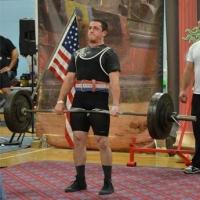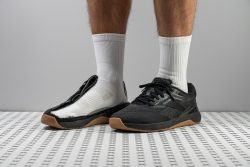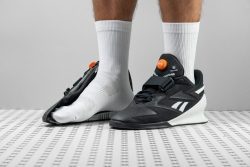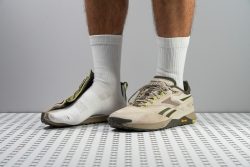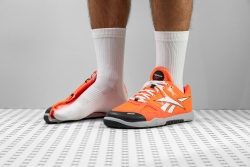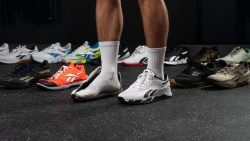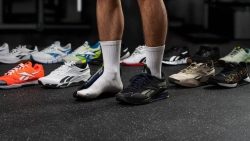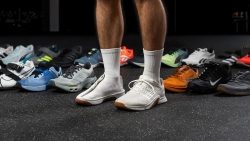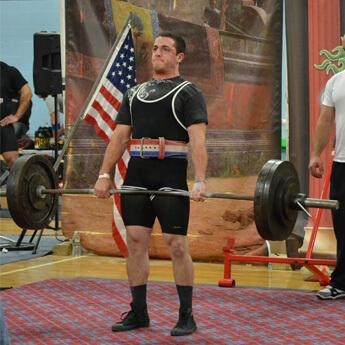4 Best Reebok Training Shoes in 2025
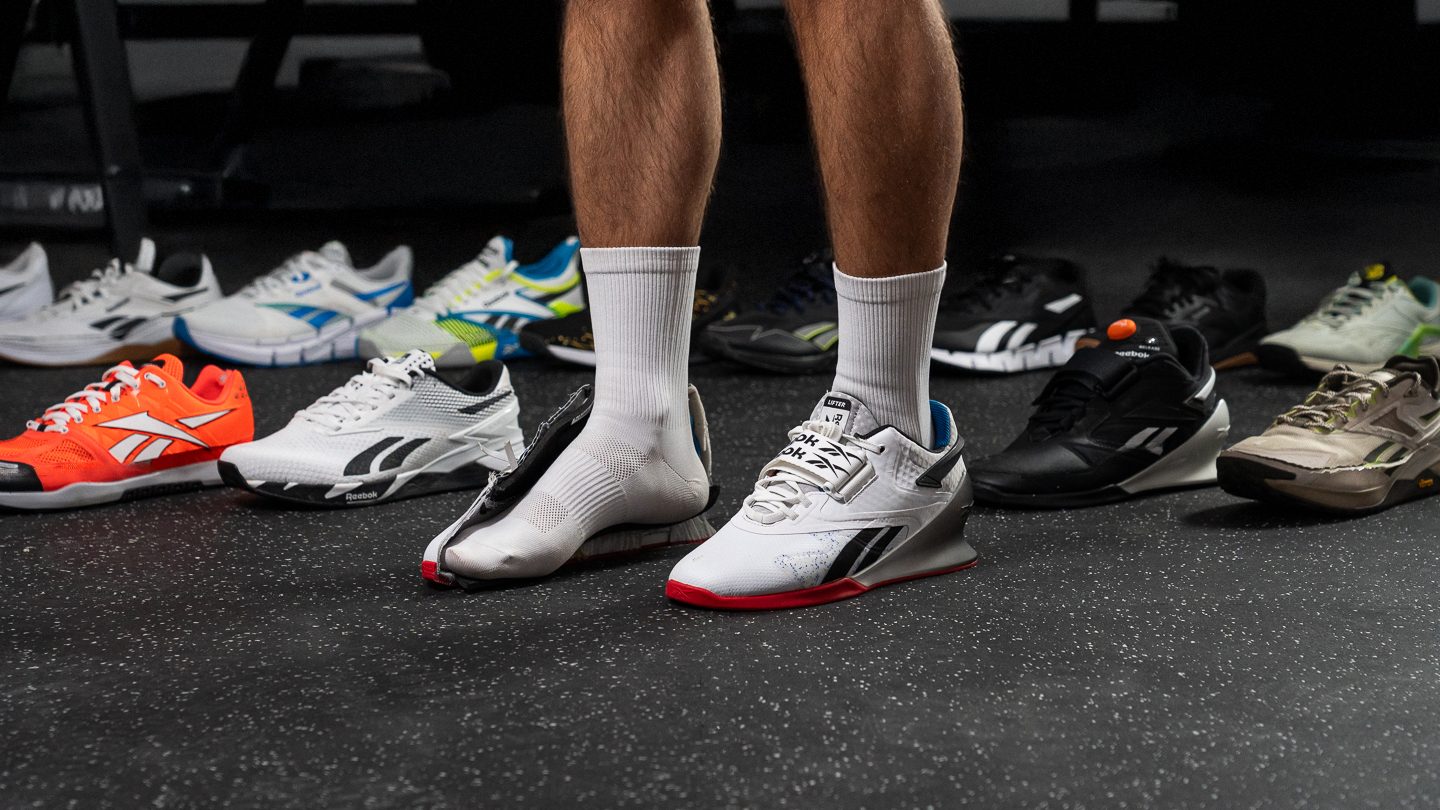
We buy shoes ourselves. We earn commissions when you buy through us, at no extra cost. Why trust us
Reebok is one of the oldest manufacturers of athletic footwear in the world. Its deep roots can be traced back as far as 1890 when they first introduced their spiked sports shoes. Since then, the brand has introduced some of the most iconic training shoes most notably the Reebok Workout Trainer.
After scoring huge sponsorship deals with the CrossFit Games, Reebok’s impressive lineup of training footwear become one of the most coveted shoe brands in the industry. Today, Reebok’s best offerings include the highly-ranked Nano collection, Speed TR, and the Reebok JJ IV.
With lots of Reebok training shoes out there, we know that getting the perfect pair for your fitness needs can be mind-boggling. To help you with that, we’ve tested and identified the truly best performers of the brand’s current lineup. We reviewed them thoroughly, going into every positive and negative attribute. Check out our top picks!
How we test Reebok training shoes
To make our recommendations, we ensure that all the Reebok shoes on this list are thoroughly tested and examined. To determine its overall value, we put each pair of training shoes into the wringer. That means hours of wear testing in the gym, and doing various workout routines.
Our data-driven approach includes:
- Purchasing the Reebok training shoes using our own money. This is in line with our company policy not to accept sponsorships when giving our reviews.
- Depending on the type of shoes, we clock up hours in the gym executing specific workout routines. We write our comprehensive reviews for each pair of shoes and identify the ones that offer the genuine highest value in specific categories.
- We also check the shoes’ materials and technologies used inside our RunRepeat shoe testing lab. We do this by splitting the shoes in half. We also measure the important parameters of the shoes that relate to their comfort, fit, durability, support, and more.
Best Reebok training shoes overall
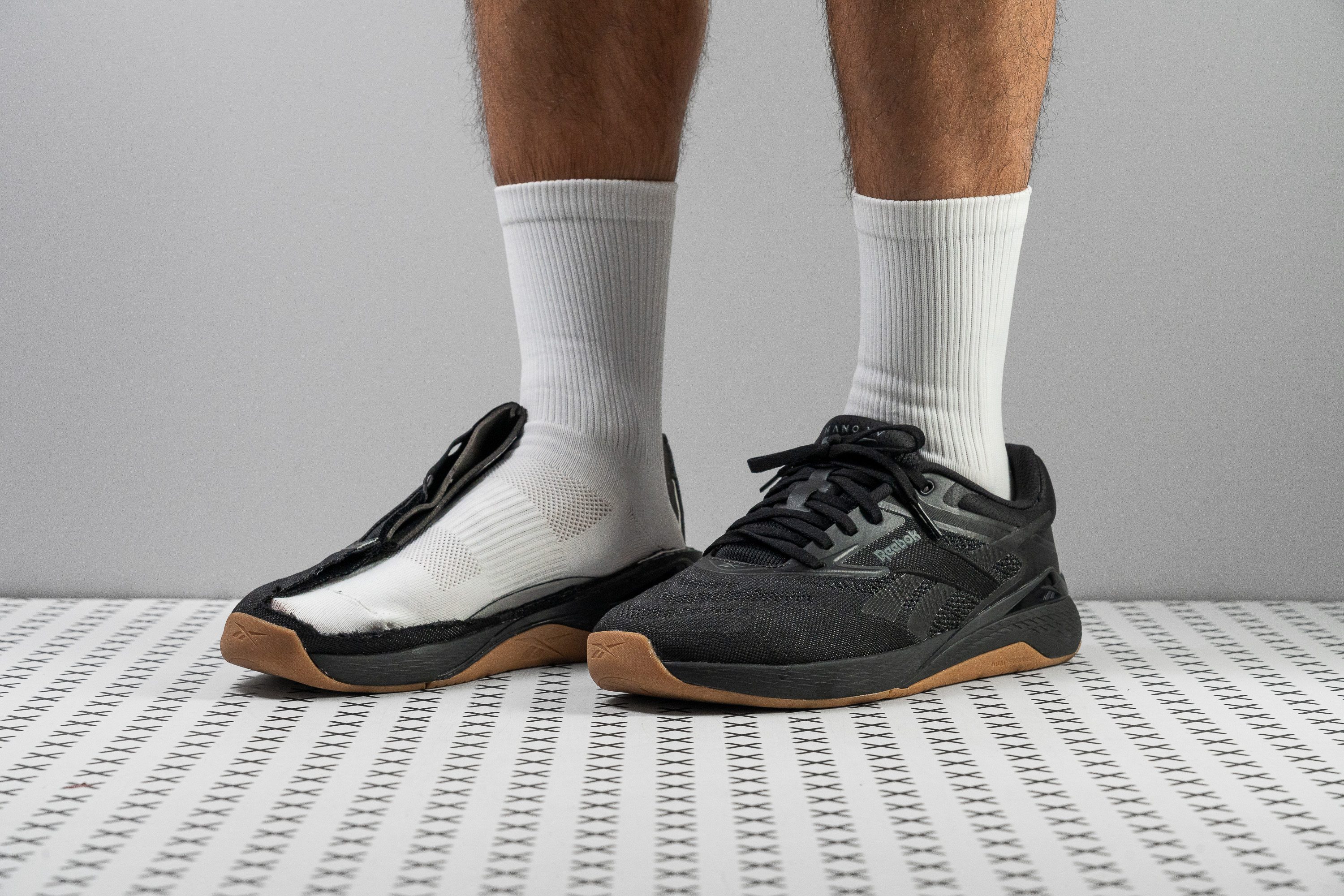











































What makes it the best?
The Nano X5 is a standout for its cushioning that adapts to the way we train, delivering comfort without compromising responsiveness and stability. Lab tests reveal it features DualResponse cushioning for both impact protection and bounce, while the stiff midsole enhances stability. Because it’s so versatile for lifting and dynamic workouts, it’s our best Reebok training shoe.
The DualResponse midsole is perfect for cross-training, with its firm heel offering support and its soft forefoot protecting our toe joints and muscles. Measuring for shock absorption, it’s the forefoot that exceeded its category’s average by 14.5%, scoring an impressive 71 SA. It proves it’s capable of reducing the forces of repetitive landings.
Not only is the front foam soft, but it is also responsive. In our energy return test, it scored 58.4%, explaining the spring we sense when we perform short sprints or jumping jacks.
To prevent losing our footing during dynamic and explosive movement, the Nano X5 features a TPU cage to add structure to the shoe. We found it highly twist-resistant, proven by its maximum 5/5 torsional rigidity score. On foot, we felt secure and well-balanced.
However, Nano X5 runs quite heavy at 12.0 oz (340g). Athletes who prefer maximum agility should go for a lightweight trainer.
Pros
- Versatile for all-around gym use
- Increased impact protection in the forefoot
- Very planted and stable heel
- Fantastic durability and wear resistance
- Padded and comfortable step-in feel
- Secure foothold and containment
- RopePro protection for rope climbs
Cons
- Lacks grip on wet and dusty floors
- Not for wide feet
- Heavier than average
Best Reebok training shoes for weightlifting
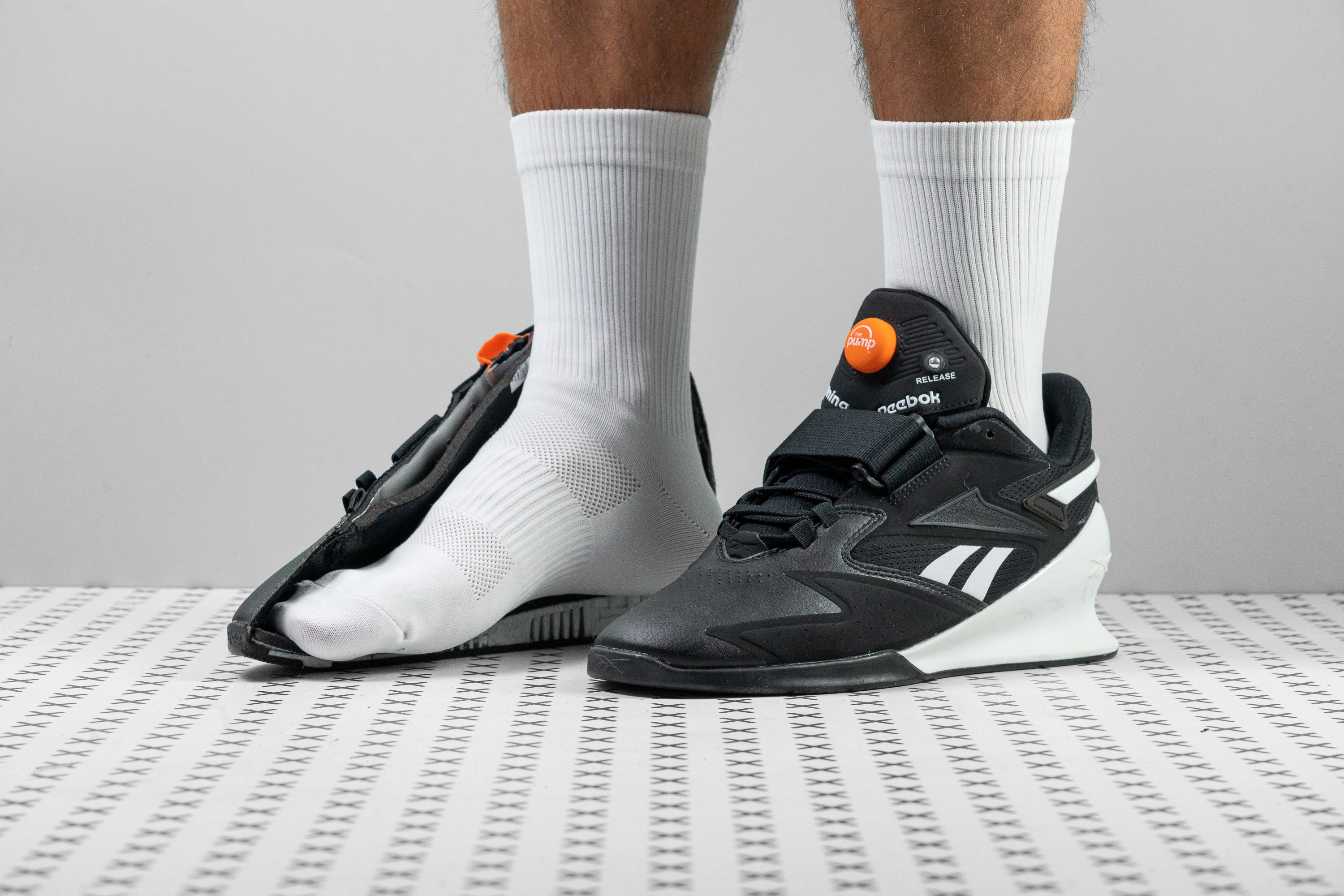




































What makes it the best?
Based on our tests and lab assessments, it’s the Legacy Lifter III from Reebok that is structured in a way that is most suitable for advanced lifters. First of all, it has a high heel-to-toe drop that works best for seasoned lifters. We also laud how resistant to twist the shoe’s platform was. The third noteworthy quality is how the rearfoot is built, it’s as if it was designed solely to lock the heel in.
After measuring it using a caliper, we discovered that the heel-to-toe drop of the Legacy Lifter 3 is 20.5 mm. Based on our data, drops of this height are favorites of experienced weightlifters because they help greatly in attaining and maintaining an upright posture.
The shoe’s twist resistance was also of note. We manually twisted this shoe in the lab, and we were left with no choice but give this part a perfect 5. We were already sweating a lot, but it still wouldn’t yield!
We performed two assessments on the heel counter: a Dremel test for durability and a manual squeeze test for stiffness. This part of the shoe scored a solid 4 out of 5 in the Dremel test while it perfected the manual squeeze test. In the gym, we never worried that our feet would ever find a way out of the heel counter’s strong clasp.
The velcro attachment was such an annoyance though. It was just too short! Good thing the tongue can be inflated to enhance the lockdown of the Reebok Legacy Lifter III.
Pros
- Mind-blowing stability
- Incompressible platform
- High heel helps with posture for squats
- Highly supportive upper
- Top-notch durability
- The Pump feature is fun and improves the fit
Cons
- Unreasonable price hike
- Short Velcro attachment
Best Reebok training shoes for outdoor workouts
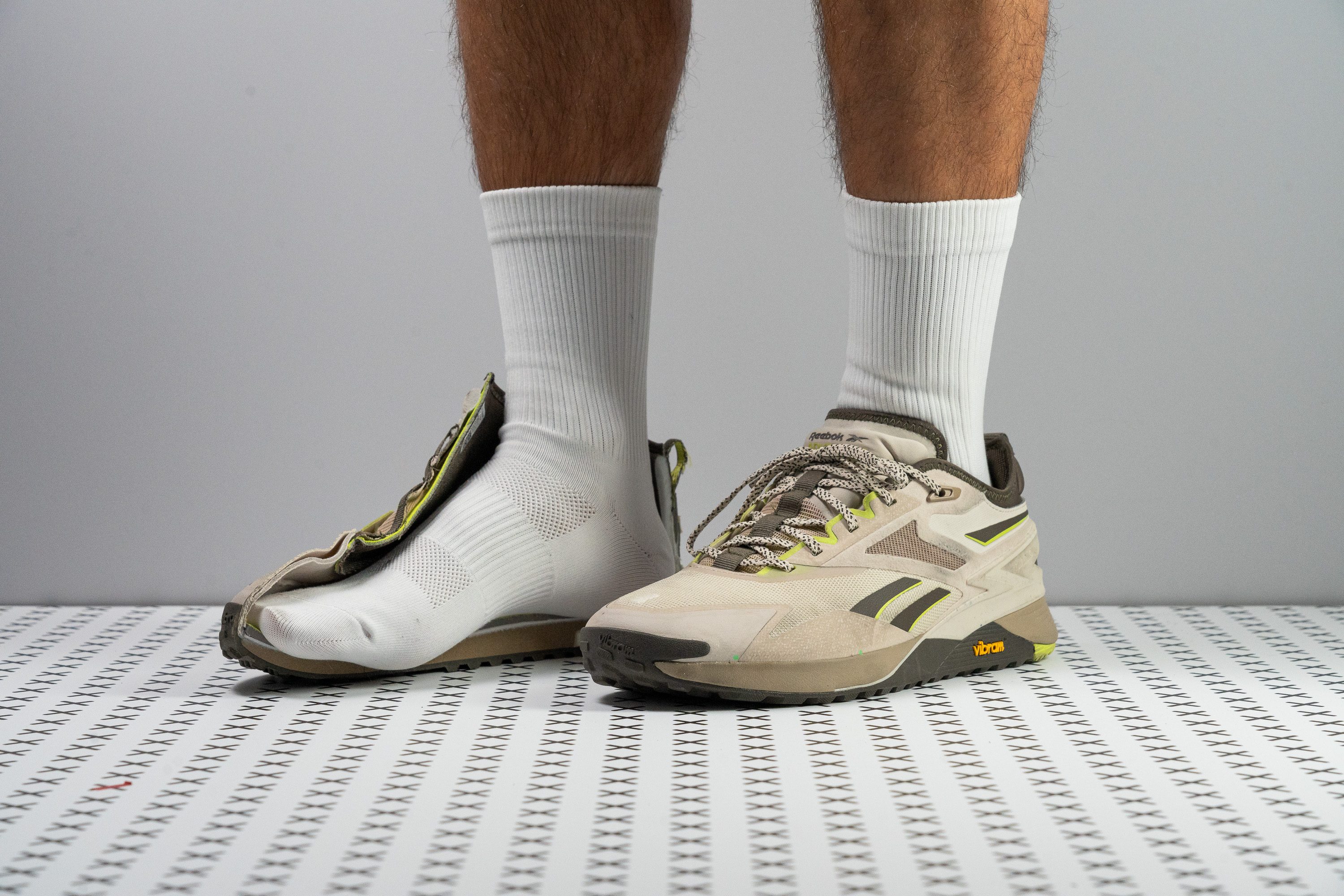









































What makes it the best?
The Reebok Nano X3 Adventure definitely made working out outdoors a lot easier. Its upper was built like a tank, and it sure felt durable even to the touch. We never had worries that our movements would ever break it. We also appreciated the firm outsole, which protected us from feeling the brunt of whatever debris we stepped on. We also had its plush midsole to provide much needed compression during our intense routines. Because of all this, we consider the Nano X3 Adventure as our best bet among Reebok trainers when it comes to outdoor exercises.
In our lab, we Dremel-drilled the upper for twelve seconds. But even such a high-pressure assault can never poke a hole in the upper. The whole process was just a mere pinch for the Reebok Nano X3 Adventure. We gave it a perfect 5 for durability, and we had no doubts about the longevity of this shoe.
According to the readings on our HC durometer, the outsole is a little firmer than average (84.0) at 89.4. Aside from protecting us from being hurt by debris, the firm outsole also contributed some springiness which made us quicker on our feet. Sprints, quick side steps, and even some jumping rope action were easy to execute because of this springiness.
Through our HA durometer measurements, we learned that the midsole of the Nano X3 Adventure is softer than average (27.2) at 21.9. It served as the soft cradle that kept all of our steps free from pain.
But good Lord was this shoe toasty! It only got the lowest 1 over 5 in our breathability tests. The upper material was pretty closed-off; it barely allowed air to go in or go out.
Pros
- Perfect gym-to-trail shoe
- Excellent traction indoors and outdoors
- Great impact protection
- Offers enough court feel
- Super durable upper
- Just enough stability for exercises
- Feels light
- Fairly flexible structure
Cons
- Poor breathability
- Pricey if not used outdoors
Best Reebok training shoes with the best value
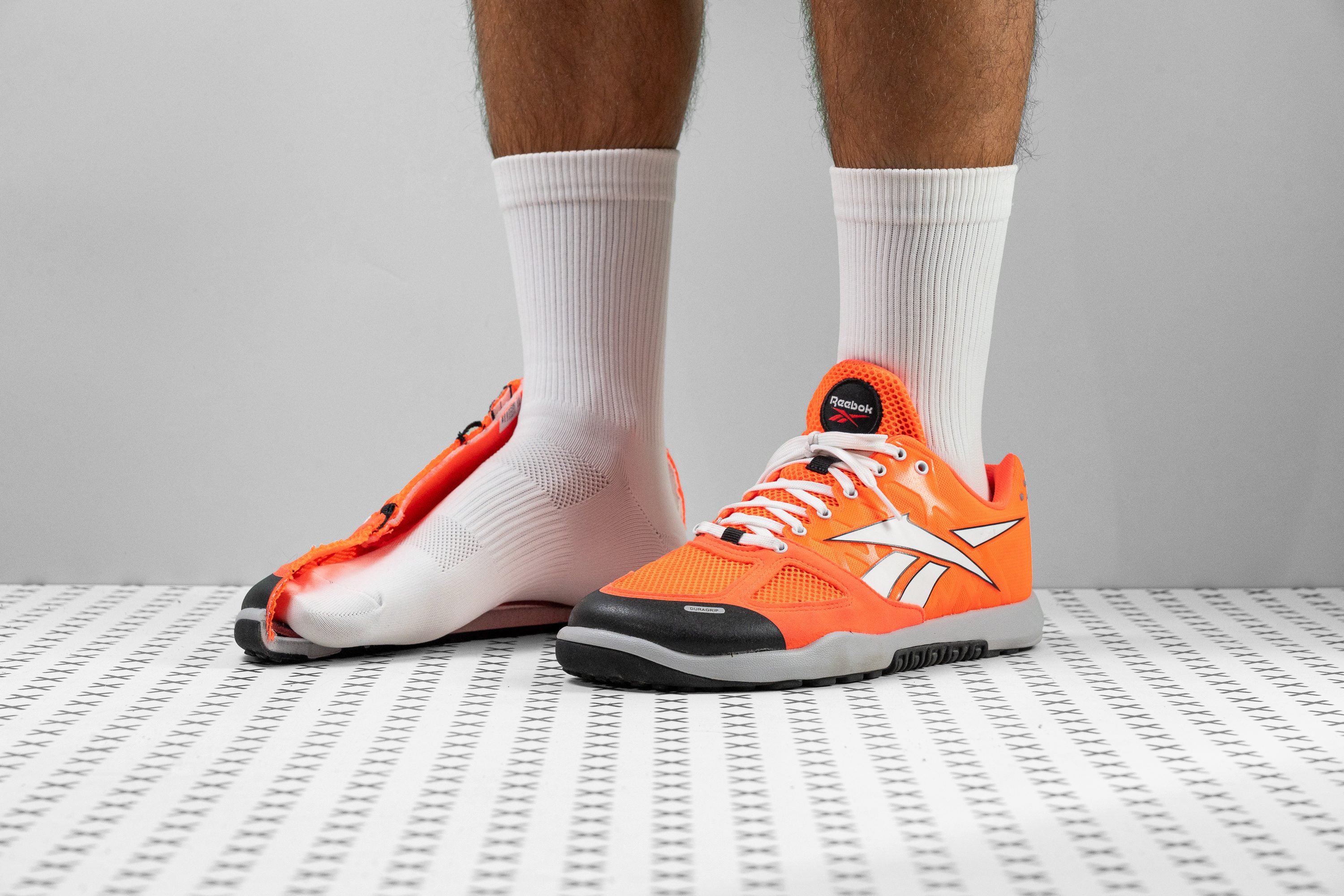










































What makes it the best?
No other Reebok training shoe brings more value to the table than the Nano 2.0, which delivers impressive lightness, flexibility, and stability for just $110. That is cheaper than the average Reebok training shoe price of $113.
At 10.09 oz (286g), the Nano 2.0 is a delightfully minimal shoe that is 1.4 oz (40g) lighter than the average training shoe. Moreover, it is 49.8% more flexible than average based on our 90 degree bend test. With that combination of lightness and flexibility, we found the shoe to be a fantastic performer on fast runs and jumps, as well as agility drills and other dynamic movements.
But this lightweight shoe is still more than capable of helping us crush some big lifts. We did not feel any instability from the midsole, which is 14.8% firmer than average, even while using fairly heavy weights. Meanwhile, the flat platform, which provides more ground contact, and the relatively low 3.1 mm heel to toe drop (0.7 mm lower than average) are both more advantageous for deadlifts.
However, we do not recommend using the Nano 2.0 for longer runs because of its minimal midsole cushioning. We measured its heel and forefoot stack to be 7 mm and 3.3 mm shorter than average, respectively.
Pros
- Pleasantly lightweight
- Low-profile and minimal
- Grounded platform
- Highly breathable
- Very flexible
- Spacious toebox
- Good outsole traction
Cons
- Lacks cushioning for jumps and runs
- Upper is not durable
- Tongue slips
